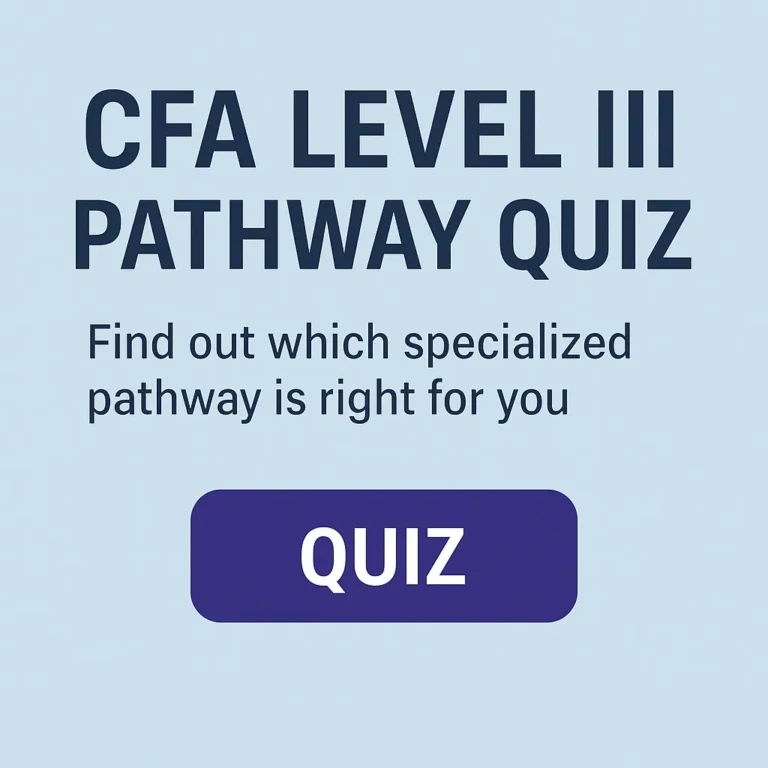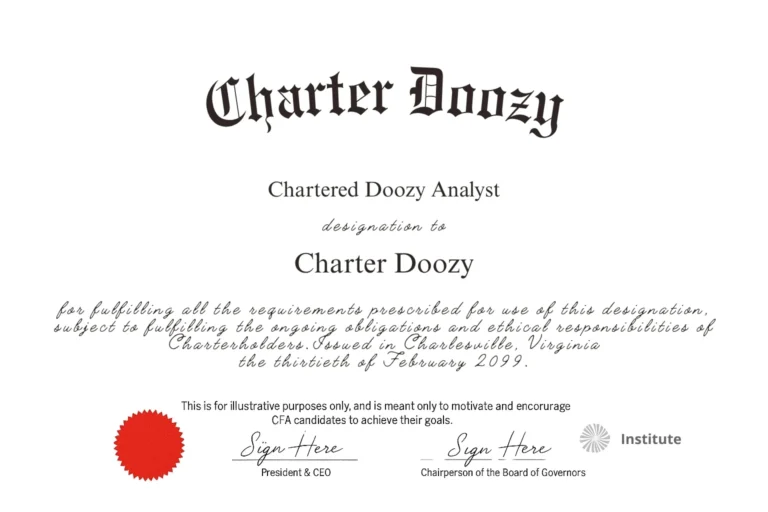Congratulations — if you’ve passed CFA Level II (or are just about to), you’re already deep into one of the most demanding and respected journeys in the world of finance.
Now, as you prepare for Level III, there’s a new twist in the path: you need to choose a specialized pathway.
This isn’t just a logistical formality.
It’s a strategic decision – one that should align with your strengths, interests, and long-term career direction.
Starting from 2025, CFA Level III offers three distinct tracks: ➡Portfolio Management, ➡Private Wealth, and ➡Private Markets.
Each leads to the same coveted charter, but the content you’ll study (and the lens through which you’ll view the finance world) will differ.
If you’re unsure which path is right for you, don’t worry.
This guide will walk you through what each pathway offers, who it’s best suited for, and how to decide.
And if you want a more personalized nudge?
We’ve built a quick, insightful quiz to help you find your best fit (more on that below).
Let’s explore what lies ahead – and help you choose your path with clarity and confidence.

Why the Path You Choose Matters
The CFA Level III exam has changed — and your approach needs to change with it.
Unlike Levels I and II, where every candidate takes the same curriculum, Level III now offers three specialized pathways.
That means you’ll focus your studies on a particular area of practice: Portfolio Management, Private Wealth, or Private Markets.
This shift reflects a broader truth about the investment profession: as you advance, specialization matters.
All Roads Lead to the Charter — But Not the Same Way
No matter which pathway you choose, you’ll still earn the exact same CFA Charter.
The letters after your name won’t be any different.
But the knowledge you gain — and how relevant it is to your career goals — will be shaped by the path you follow.
In other words, your pathway won’t define your entire future, but it can give you an edge in the field you’re most excited to grow into.
Alignment Is the Goal
The right pathway for you is the one that matches your:
Career aspirations — where you want to go professionally
Personal interests — what kind of work energizes you
Natural strengths — the way you like to think, engage, and solve problems
Choosing intentionally now means you’ll get more out of the material, feel more connected to your studies, and set yourself up for a smoother transition from passing the exam to applying the knowledge in real-world roles.

The Three Pathways at a Glance
The CFA Level III exam now offers three distinct pathways, each tailored to a specific segment of the investment profession.
While the foundational ethics and professional standards remain consistent across all tracks, the core curriculum diverges to reflect the unique challenges and responsibilities of each specialization.
Let’s break down what each pathway covers — and who it’s best suited for.
Portfolio Management
What it focuses on
This pathway is grounded in public markets and professional asset management.
It emphasizes portfolio construction, investment policy statements, risk management, performance evaluation, and capital market expectations.
You’ll apply quantitative thinking to real-world investing strategies.
Who it’s for
Candidates aiming for careers in:
Asset management
Institutional investing
Investment strategy
Research and analytics
If you enjoy analyzing markets, building diversified portfolios, and thinking in terms of risk-adjusted returns, Portfolio Management might be your natural fit.
Private Wealth
What it focuses on
The Private Wealth track centers on serving high-net-worth individuals and families.
It covers financial planning, behavioral finance, estate and tax planning, and managing client relationships.
Communication, personalization, and trust-building are core themes.
Who it’s for
Candidates working toward roles such as:
Private wealth advisor
Financial planner
Family office professional
Private banker
If you enjoy working one-on-one with clients, guiding life and legacy decisions, and crafting tailored investment strategies, Private Wealth is likely your path.
Private Markets
What it focuses on
This specialized track is focused on illiquid and alternative assets — like private equity, venture capital, real estate, and infrastructure.
It emphasizes fund structures, deal sourcing, valuation, performance metrics, and exit strategies.
Who it’s for
Ideal for those pursuing careers in:
Private equity
Venture capital
Infrastructure investing
Corporate development or M&A
If you’re drawn to deal-making, long-term value creation, and managing capital outside traditional markets, the Private Markets pathway offers a deep, relevant curriculum.

Key Questions to Ask Yourself
With three strong options available, how do you decide which CFA Level III pathway is right for you?
It starts with reflection. The best choice isn’t just about your current job title — it’s about aligning your interests, skills, and ambitions with the content you’ll be diving into for the next stage of your CFA journey.
Here are a few powerful questions to guide your thinking:
1. Who do you want to work with?
Individuals and families → Private Wealth
Entrepreneurs and business owners → Private Markets
Institutions and large investors → Portfolio Management
2. What kind of problems do you like to solve?
Helping people plan for their futures
Structuring complex deals and maximizing returns
Optimizing portfolios under risk and return constraints
Your answer points toward the type of client or investment universe you want to be immersed in.
3. What excites you more — the relationship or the research?
If you’re energized by building trust, guiding life decisions, and managing emotion: Private Wealth might be your home.
If you thrive on strategy, structure, and high-stakes negotiations: Private Markets could be your path.
If you’re all about models, data, and long-term alpha: Portfolio Management is a strong fit.
4. What does your future look like?
Picture your dream role in five years. Are you:
Running a family office?
Leading investment committees?
Closing private equity deals?
Designing ETF strategies?
The vision you hold for your career is one of the clearest signals for which pathway to choose.
Still not sure? Try the quiz.
Sometimes, seeing your preferences scored across all three pathways can bring clarity fast.
Common Scenarios and How to Decide
Still weighing your options?
You’re not alone.
Many candidates arrive at Level III with a hybrid background or an evolving career path.
To help clarify things, here are a few realistic scenarios — and how they might influence your pathway choice.
Scenario 1: The Client-Focused Advisor
“I’ve spent the last few years working as a financial planner. I enjoy the personal side of the job — helping people make smart long-term decisions and seeing the impact of those choices on their lives.”
Recommended Pathway: Private Wealth
You’re already immersed in the kind of work the Private Wealth track is built around.
This pathway will deepen your understanding of behavioral finance, estate planning, taxation, and portfolio construction for individuals and families — all tailored to the high-net-worth space.
Scenario 2: The Deal-Oriented Analyst
“I’m currently in corporate finance and increasingly involved in evaluating investment opportunities and M&A activity. I love the hands-on, strategic nature of deals.”
Recommended Pathway: Private Markets
This is a perfect fit. The Private Markets track focuses on the lifecycle of private investments — from sourcing and structuring to valuation and exit.
If you’re eyeing a move into private equity, venture capital, or infrastructure investing, this path will be immediately relevant.
Scenario 3: The Data-Driven Strategist
“I’ve always loved researching markets, building models, and thinking in terms of macro themes and long-term strategy. I want to work in asset management or on an investment desk.”
Recommended Pathway: Portfolio Management
This is your domain. The Portfolio Management pathway dives deep into asset allocation, performance measurement, and investment policy creation.
It’s ideal for those who enjoy optimizing risk-adjusted returns in public markets and guiding institutional mandates.
Scenario 4: The Career Changer
“I’ve been in a general finance role and want to specialize, but I’m not sure which direction to take. I like working with people but also enjoy research.”
Recommended Approach: Take the Quiz & Reflect
If you’re in between paths or new to the investment profession, don’t stress.
Many CFA candidates pivot as their interests evolve.
The best move is to explore each pathway’s curriculum and outcomes — and take the Pathway Quiz to get a clearer sense of where your strengths lie.
These scenarios aren’t exhaustive, but they highlight something important: your decision doesn’t have to be perfect — just intentional.
The right pathway builds on where you are today and helps guide where you’re going next.
Doozy Digest
A newsletter for CFA candidates
Subscribe for:
✔ Insightful tips
✔ Expert advice
✔ Career motivation
✔ Exam inspiration
Stay updated and subscribe today!
CFA Institute Rules for Specialized Pathways
Before selecting your CFA Level III pathway, it’s important to understand the rules set by the CFA Institute:
You must choose your pathway when you register for Level III.
You cannot switch pathways after registration unless you:
Fail the exam, or
Withdraw and re-register in a future exam window
Regardless of your chosen pathway, you’ll earn the same CFA Charter once you pass.
All candidates cover the core curriculum (Ethics, Professional Standards, etc.), but your selected pathway determines the specialized content and case studies you’ll be tested on.
Make your decision carefully — your pathway selection cannot be changed once you’re locked into your exam window.
Choose wisely — and intentionally — based on your career direction and interests. You’re committing to that pathway for this exam cycle.
You’re Not Locked In Forever
Let’s clear up a common fear: choosing a CFA Level III pathway does not mean you’re stuck in that niche for life.
Yes, the curriculum you study will be more focused. And yes, the examples and case studies will be tailored to your chosen track.
But ultimately, you still earn the exact same CFA Charter — no asterisks, no limitations, no tiered designations.
All Roads Still Lead to the Charter
Whether you take the Portfolio Management, Private Wealth, or Private Markets pathway, your certificate will look the same.
Employers won’t see a footnote saying which pathway you chose — but you will know that you leaned into the content most aligned with your current goals and strengths.
That insight matters — both for your learning experience and for your confidence as a professional.
Careers Aren’t Linear — and That’s Okay
You may start in private banking and later move into asset management. Or begin in portfolio analysis and eventually join a VC fund.
That’s the nature of a dynamic, evolving career.
What matters is choosing the path that:
Keeps you engaged in your studies
Feels relevant to your career stage and ambition
Helps you finish the CFA Program strong
Think of it not as a permanent label, but as a strategic advantage for where you are now.
Quick Comparison: Which CFA Pathway Speaks to You?
| Feature | Portfolio Management | Private Wealth | Private Markets |
|---|---|---|---|
| Focus Area | Public markets, portfolio construction, risk management | HNW clients, financial planning, estate & tax strategies | PE/VC, real assets, illiquid investments, deal lifecycle |
| Ideal Roles | Asset manager, fund analyst, CIO, strategist | Wealth advisor, private banker, family office planner | PE/VC analyst, fund manager, deal lead, corporate development |
| Key Skills Emphasized | Quantitative analysis, asset allocation, benchmarking | Client communication, behavioral finance, legacy planning | Deal structuring, valuation, fund performance, exit strategy |
| Curriculum Emphasis | Strategic portfolio design and risk-return optimization | Personalized planning, long-term client outcomes | Private capital lifecycle and investment execution |
| Typical Client | Institutional investors, pension funds | High-net-worth individuals and families | Startups, private companies, LP/GP investors |
| Best For | Analytical minds who enjoy market strategy | People-focused professionals who enjoy guiding clients | Deal-driven thinkers who enjoy value creation |
Final Thoughts
Choosing your CFA Level III pathway is more than an academic decision.
It’s an opportunity to align your studies with your future.
Whether you’re drawn to managing portfolios, guiding wealthy clients, or structuring private deals, the pathway you select should reflect where you want to grow.
That said, don’t let the decision paralyze you.
All three pathways lead to the same globally respected CFA Charter.
What matters most is that you choose a track that keeps you engaged, energized, and moving toward your career goals.
Take time to reflect.
Speak to mentors.
Revisit your long-term vision.
And if you’re still unsure, our Pathway Quiz can offer valuable insight and clarity.
You’re in the final stretch of the CFA journey — make your next move with purpose and confidence.
You’ve come this far.
Now finish strong. 💪
Frequently Asked Questions (FAQs)
1. Do all CFA Level III candidates now have to choose a pathway?
Yes. Starting with the new exam format, all CFA Level III candidates must select one of three pathways: Portfolio Management, Private Wealth, or Private Markets.
2. Can I switch pathways after registering?
No. Once you’ve registered and selected your pathway, you cannot change it unless you fail or withdraw and re-register for a future exam cycle.
3. Does the pathway I choose appear on my CFA Charter?
No. All candidates who pass Level III and meet the work requirements receive the same CFA Charter, regardless of their chosen pathway.
4. Which pathway is most popular or easiest?
There is no “easy” pathway — all are equally rigorous. Choose the one that aligns with your interests, experience, and career goals, not popularity.
5. What if I’m unsure which pathway to take?
That’s completely normal. Reflect on your strengths, goals, and preferred work environments — and consider taking our Pathway Quiz to gain clarity.
6. Can I access all pathway content even if I pick one?
No. You’ll only have access to the curriculum and mock exams specific to the pathway you choose. This ensures a more focused and tailored learning experience.
7. Will employers care which pathway I chose?
Not usually. Employers value the CFA Charter overall. However, choosing a pathway aligned with your desired role can give you an edge in job interviews and practical applications.
8. What kind of roles align with each pathway?
Portfolio Management → Asset managers, analysts, CIOs
Private Wealth → Financial advisors, private bankers, family office planners
Private Markets → Private equity, venture capital, corporate development
9. How does this impact study materials or prep providers?
Many third-party providers now offer pathway-specific content, so be sure to select materials that match your chosen track. The CFA Institute curriculum is also pathway-specific.
10. Is it possible to succeed in a different field than my pathway later on?
Absolutely. Your pathway enhances your expertise in one area but doesn’t limit your future. The CFA Charter remains broad and respected across all areas of finance.
11. When do I need to choose my Specialized Pathway — and can I change it later?
You must select your pathway at the time of registration for CFA Level III. You may change it within CFA Institute’s 14-day “buyer’s remorse” period by canceling and re-registering — but after that, your selection is locked in for that exam cycle.
12. How much of the Level III exam is specialized content versus core content?
Approximately 65–75% of the CFA Level III curriculum is core content shared by all candidates. The remaining 25–35% is pathway-specific, based on your chosen specialization.
13. What is the Practical Skills Module (PSM), and how does it relate to the pathways?
The PSM is a new required component of the CFA Program, designed to build practical, hands-on skills. Level III candidates must complete one PSM — like “Portfolio Development and Construction” — before receiving their exam results. While separate from the pathways, the PSM complements your study with real-world applications.
14. Can I access the other pathway content after I become a Charterholder?
Yes. While you can only choose one pathway for the Level III exam, CFA Institute plans to make all pathways available to Charterholders later for continuing education and professional development.


